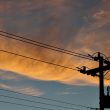5G providers reject mandates for backup power at cell sites
Cellular networks can sometimes play an outsized role in disasters because they can often function on backup power sources like generators. Meaning, when nothing else is working, cell phones can connect calls.
But the nation’s biggest wireless providers – as well as a variety of other entities – are pushing against suggestions that the federal government mandate the use of backup power generators at all cell sites.
“Planning and managing backup power resources thus requires case-by-case judgments that are not amenable to prescriptive rules,” Verizon told the FCC in a recent filing. “Rules and policies that micromanage or enable regulators to routinely second-guess or delay these granular network engineering decisions will do more than aggravate a service provider’s legal department. They will have a daisy chain effect on site placement, cost, and service reliability across a geographic area – an already complex process under existing state and local zoning and landlord restrictions.”
For example, Verizon argued that a requirement to store fuel in one area that still has power could prevent wireless carriers from moving that fuel to another area that has run out of fuel. “Only flexible, feasible, uniform and predictable standards could serve the public interest,” Verizon argued.
Planning for the worst
In general, the US wireless industry has rejected increased federal oversight over providers’ operations. That position stretches across topics, including net neutrality and network coverage. And in the case of backup power, network operators generally argue that they’re already heavily using generators and other backup power technologies – but that federal rules could get in the way of their efforts to quickly respond to troubles.
“As just one example, in advance of Hurricane Ida [in 2021], AT&T arranged for over one million gallons of fuel to be available to it in anticipation of extensive and prolonged power outages and to support AT&T’s fleet during its significant restoration efforts,” AT&T told the FCC.
But the carrier said it can’t install backup power generators at all of its cell sites.
To read the complete article, visit Light Reading.


















Certainly we’ve seen this tendency of telecom providers to work to provide a service as cheaply as possible. VOIP is 100% that. The downside is that this cheap service is not a public safety grade service, thats designed to work all the time. There is too much competitive pressure in telecom.